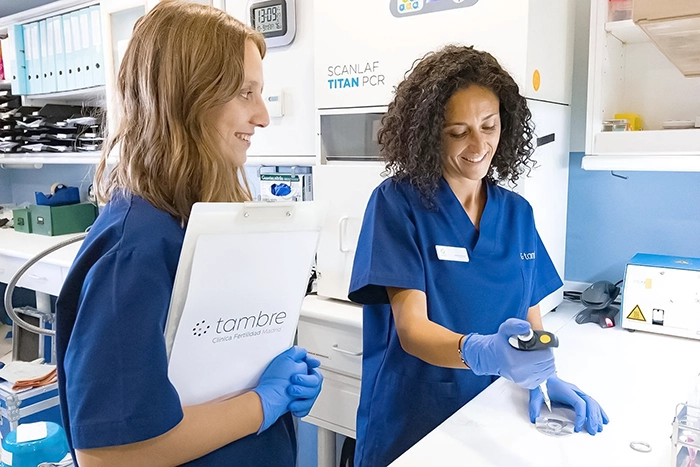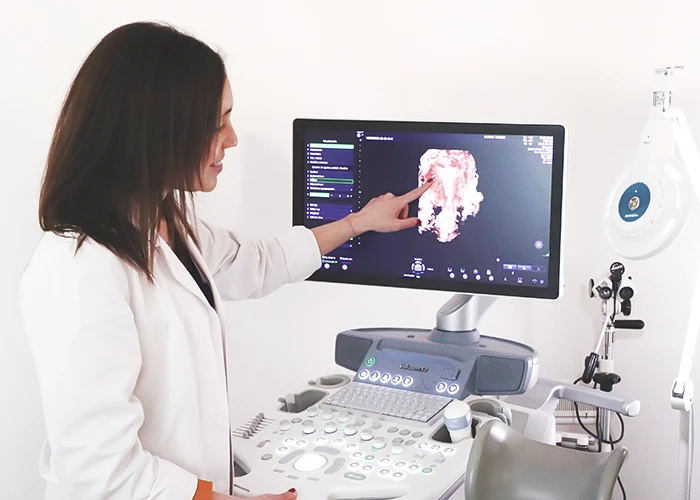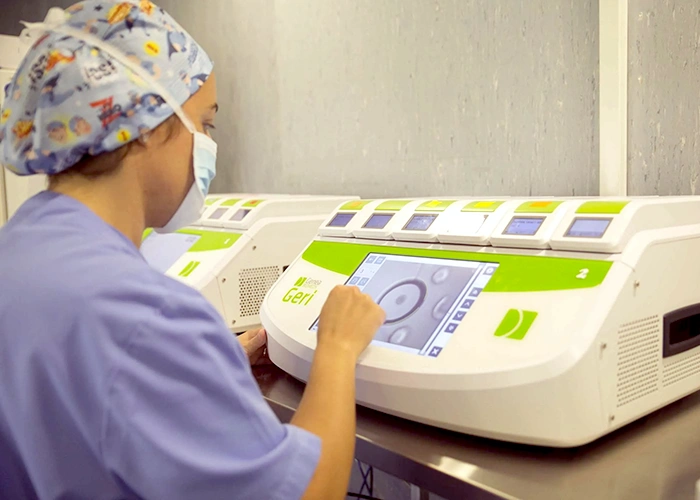Scientific Research
The progress made every day in the field of reproduction means that it’s imperative that we constantly update our scientific knowledge.
45 years committed to progress
Clínica Tambre has been working for 40 years to increase its knowledge on assisted reproduction and has pioneered research on male factor infertility and abnormalities in sperm quality. We’ve helped thousands of couples make their dreams of having a child come true.
Clínica Tambre is among the Assisted Reproduction clinics with the largest number of scientific publications and the highest participation in National and International Conferences
Research in Collaboration with Universities
Clínica Tambre lives by the motto research means knowledge, knowledge means help, which is why we are currently collaborating on several lines of research with prestigious Spanish and foreign universities including:
- The Complutense University of Madrid
- The Autonomous University of Madrid
- The University of San Francisco
- The University of Philadelphia
- The University of Palermo
- The University of Badajoz
- The University of Alicante
Do you want to see some of our most significant research?
Studies on Male Factor Infertility

The study of men with azoospermia, i.e., men who have no sperm in their ejaculate, is one of the lines of research that Clínica Tambre has pioneered and which it has been working on for years.
Clínica Tambre has developed a technique for freezing testicular sperm which makes it not only possible to bypass a second testicular biopsy, but also to achieve high pregnancy rates with frozen sperm.
At Clínica Tambre we know that sperm is just as important as eggs in achieving pregnancy. Therefore, Clínica Tambre has been collaborating for many years with the Autonomous University of Madrid to study the DNA and integrity of spermatozoa.
Our research has led us to be the first to demonstrate how DNA fragmentation is a dynamic process as well as highlighting the importance of processing sperm samples in the lab as quickly as possible.
At Clínica Tambre we study all types of sperm abnormalities in men such as Kartagener Syndrome, also known as immotile ciliary syndrome, which is characterised by a lack of motile sperm.
Afamin is a protein related to diseases such as cancer, diabetes, hypertension, and pregnancy complications. However, it had previously never been linked to infertility. Afamin’s main role is to transport vitamin E to the organs that need it. Clínca Tambre’s research on this subject has linked this protein to a low sperm count and sperm motility.
This discovery will allow us to determine which men are eligible to undergo vitamin E treatment to increase their fertility.
This study was carried out in collaboration with the University of Vigo and Professor Roman Kireev.
Studies on Female Factor Infertility

The low number of oocytes produced by young women after ovarian stimulation is one of the greatest challenges for researchers at Clínica Tambre. Up until now multiple studies have shown that oxidative stress is, in many cases, the cause of this low response. To verify whether antioxidant treatment is the most suitable option for these types of patients, a clinical trial with melatonin is currently being carried out.
To see the complete research paper, click on the publications below:
Implantation failure is one of the lesser-known causes that makes pregnancy impossible.
Clínica Tambre was the first clinic to incorporate an immunology service for its patients: The immunological factors that may prevent pregnancy are studied by a specialist in the field, enabling them to prescribe the appropriate therapy.
Multiple studies on this topic have been published in collaboration with other clinics including the Gregorio Marañón Hospital in Madrid
To see the complete research paper and the results of our collaboration, click on the publications below:
Publication nº1 | Publication nº2
Por otra parte, también hemos querido conocer las diferencias que existen en el endometrio de mujeres con infertilidad, en comparación con el de donantes fértiles. Para ello, colaboramos con la Universidad de Palermo. Para ver el resultado de esta colaboración: Click here
At Clinica Tambre we were the first to set up an immunology service.
Studies on Couples

At Tambre we care not only about achieving pregnancy, but also about having a healthy child at home.
Laboratory Studies

We were the first clinic to use low-oxygen incubators, which guarantee optimum results for embryo development until the blastocyst stage.
Tambre carried out a study to measure the effects of micro-environments on thawed embryos and to compare incubators with different oxygen levels. The study concluded that the use of low concentrations of O2 in their micro-environment is recommended for the development of cryopreserved embryos on day +3 because it increases pregnancy rates.
We were the first Assisted Reproduction centre to use low-oxygen incubators.
Sociological Studies

Gamete Donor Profile: All donors that come to the Clinic for sperm and egg donation undergo an evaluation which helps us get to know them better. This evaluation lets us know why they’ve come into the clinic, where they’ve come from, and what their occupation is.
Ethical Studies

